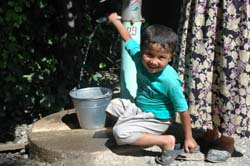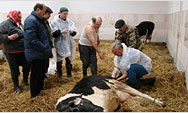You are here » Home » Telling Our Story
Case Study
Hundreds of families share access to clean drinking water
Clean Water Eases Ethnic Tensions

| |
Photo: Mahabat Alymkulova
|
|
An Uzbek boy fills up on fresh water
from the Kyrgyz well.
“We are all parents,” said
Nasiba Ganieva, a 57-year-old
Jar-Kyshtak resident. “We all
want our children to stay
healthy. [Water] is our life.”
|
Challenge
Jar-Kyshtak is a village of 2,400 people bordering Uzbekistan in southern Kyrgyzstan. After the collapse of the Soviet Union, the village infrastructure rapidly deteriorated. The villagers had no drinking water, and residents were forced to drink irrigation water. Runoff from the cotton and rice fields, this water was contaminated with fertilizers and created a high rate of hepatitis A and typhoid among the villagers. Ethnic tensions also flared up when the Soviet Union dissolved. Once an integrated village, Jar-Kyshtak split into two communities, Jar-Kyshtak on the Kyr-gyz side and Komurchi on the Uzbek side.
Initiative
In 2001 USAID launched the $3 million Peaceful Communities Initiative to open lines of communication between cross-border communities in the area. In an effort to address specific sources of conflict the initiative has rebuilt the water distribution system, as well as repairing the gas distribution system, improving schools and creating multi-ethnic sports teams and children’s festivals.
Results
Over five months in Jar-Kyshtak, the community reconstructed the old drinking water system and dug 30 new wells. The whole community—more than 400 families—participated in the project. Although the local government of Komurchi was reluctant to become involved, the people of Jar-Kyshtak invited the 160 citizens of the Uzbek enclave to use the fresh water at the new wells. “No one from the Kyrgyz village prevents them from drinking our water.... We are all brothers,” said Ganiev Alijan, manager of the water system.
Print-friendly version of this page (244kb - PDF)
Click here for high-res photo
Back to Top ^ | 

